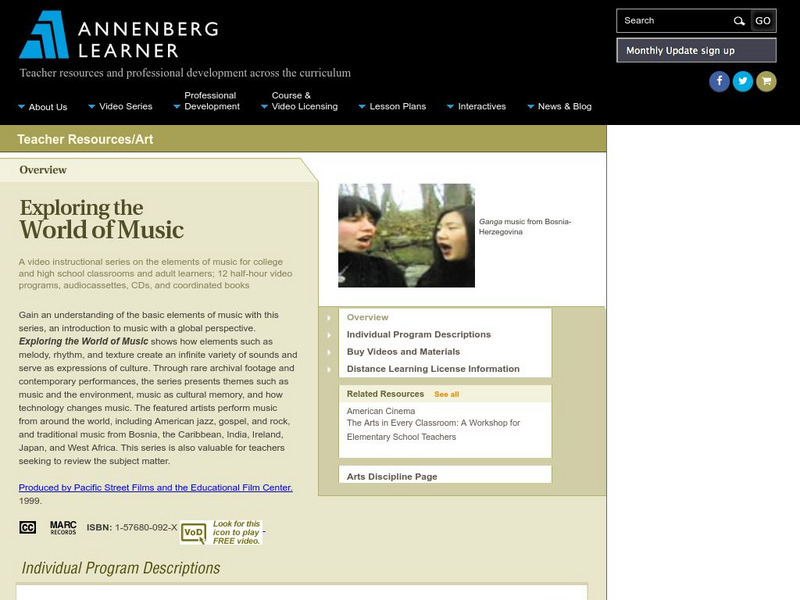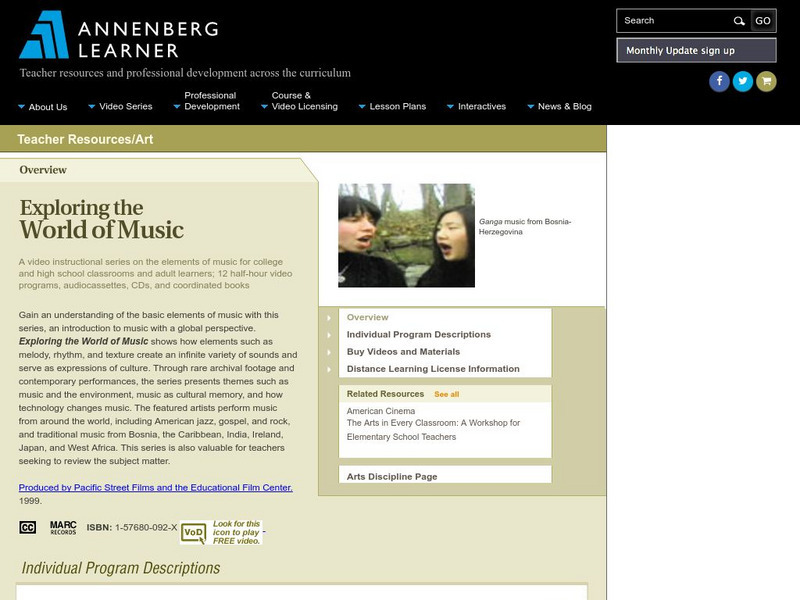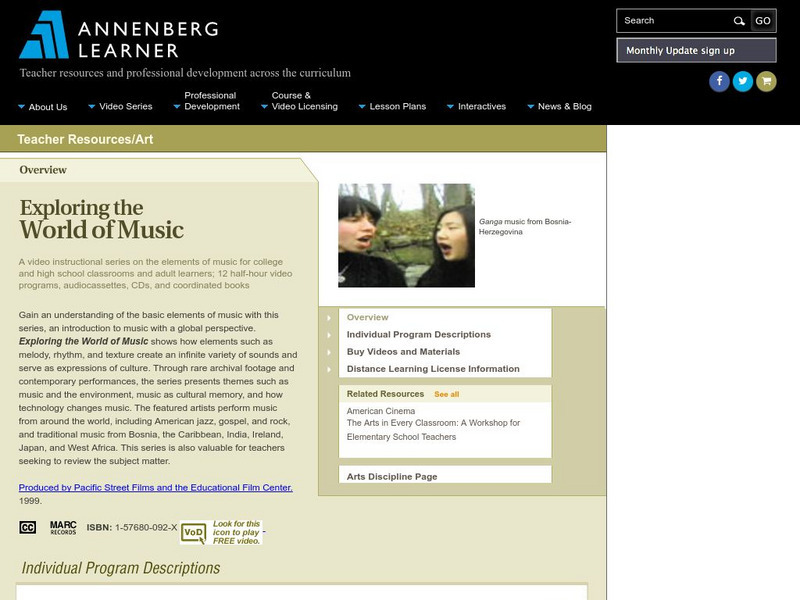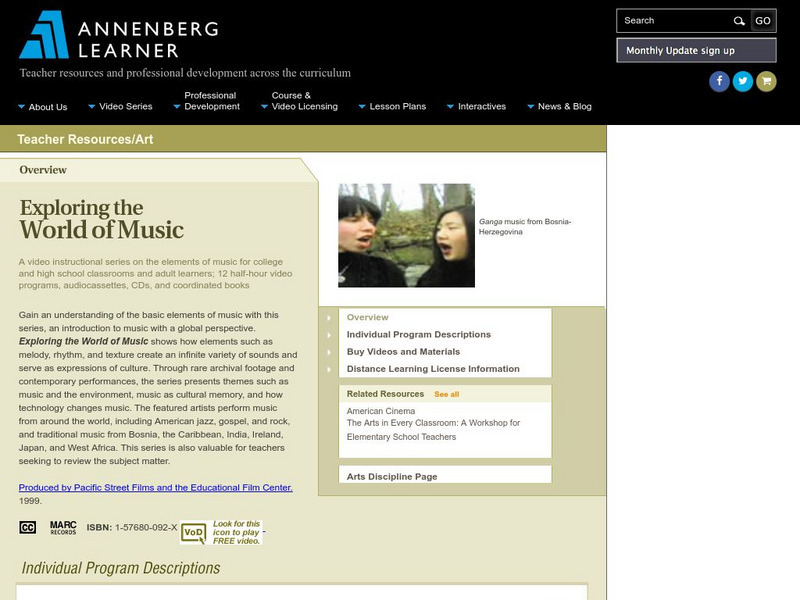California Academy of Science
Jellies at the Academy
Jellyfish are captivating creatures. A biologist shares her life with the jellies as she feeds, raises, and studies them every day. This would be a pertinent video when you are teaching marine biologists about reproduction, defensive...
California Academy of Science
Earthquake Monitoring
Ten seconds doesn't seem like much time, but if people had that much of a warning before a big earthquake hit, it could save countless lives and prevent serious injury. The video points out that, by measuring the quick-moving P-waves and...
California Academy of Science
34,000 Year-Old Fiber
In a discovery that would make Betty Rubble squeal with joy, scientists discovered fibers in a cave from 34,000 years ago that were dyed in pinks and blues. The video details the findings, which were not only unique because of the...
Science Today
189 New Species
Only two minutes long, this video explains that 189 species of animals were added to the list of known species in the year 2012. An interview with the Dean of Science and Research Collections from the California Academy of Sciences...
Science Today
Earth at Night
The Sumoi NPP satellite collects light from Earth's surface during nighttime hours. From the images produced, scientists can study populations, pollution, sea ice, moon phases, and more! This brief video clip would be a high-quality...
Science Today
Water on the Moon
A super short video explores the announcement of finding water on the moon! With about a minute and a half of information, viewers learn that on November 13, 2009, water molecules were detected in a plume of moon dust by the...
Science Today
The LHC
The Large Hadron Collider is the highest energy-particle collider that scientists have ever designed, but is it safe? Interviews with several scientists explain what it does, why it was built, and what we can learn from it. Show this in...
California Acadamy of Sciences
Science Informing Art
What does art have to do with science? Follow Maya Lin, an artist and environmental activist who recently installed a piece of art at the California Academy of Sciences. Kids will learn about her mission to spread global awareness...
California Academy of Science
Octopus Tool-Use
There is a wealth of evidence to suggest that octopi are the smartest of all invertebrates; observe why as you see an octopus walk across the ocean floor carrying a coconut shell to use as shelter. The video alone is short and does not...
California Academy of Science
The LCROSS Mission
True or false: Earth is the only body in our solar system with water. If you said true, perhaps you didn't hear about the LCROSS mission in which NASA crashed a probe into Earth's moon looking for water. Learn about the mission and its...
California Academy of Science
Therapy for Color Blindness
Could a virus be the key to reversing color blindness in humans? Some researchers believe so, and have even tested it out on monkeys. Learn more about the experiment and its effects in a short video that could accompany a lesson on gene...
California Academy of Science
Earthquake Engineering
Protecting buildings, bridges, and roadways from damage during an earthquake is an important task for engineers. Discover how one lab goes about testing the safety of existing and yet-to-be-built structures with a short video. See some...
California Academy of Science
Monarch Migration
It takes four generations of Monarch butterflies to complete the migratory path from the Rockies to Mexico each year, so how do they know where to go? The answer may surprise you; it certainly surprised the scientists who figured it out!...
California Academy of Science
Islands, Birds and Disease
Island chains are some of the best environments to study evolution and the small adaptations that occur in an isolated ecosystem. Papua New Guinea is an excellent example of these evolutionary gems, with a diverse bird population on its...
California Academy of Science
Understanding Viruses
Evolution occurs on large and small scales, in both living organisms and viruses. By learning the pathway taken by pathogens such as the virus that causes dengue fever, scientists can get one step closer to understanding how to stop...
PBS
Pbs Kids Clubhouse Adventures: Clubhouse Theme: What Is Music?
Exploring our world is fun! Abby Brown, KIDS Clubhouse Adventures co-host, loves to help kids have fun while learning! In this segment, Abby teaches all about music, including instruments, voice, pitch, tempo, and volume. [2:38]
NeurOreille
Journey Into the World of Hearing: Music Perception
Through a series of flash animations, learn how our ears perceive different elements of music.
Annenberg Foundation
Annenberg Learner: Exploring the World of Music: Sound Music and the Environment
This video explores the scientific and poetic definitions of music and the impact culture has on music the types of music produced. The video is part of the Exploring the World of Music instructional series. [26:47]
Annenberg Foundation
Annenberg Learner: Exploring the World of Music: Composers and Improvisers
In this video, composers and improvisers are compared and contrasted with use of different types of music showing variation and fixed elements. The video is part of the Exploring the World of Music instructional series. [26:48]
Annenberg Foundation
Annenberg Learner: Exploring the World of Music: Form: The Shape of Music
In this video, musical form is explored using different types of music. The video is part of the Exploring the World of Music instructional series. [26:48]
Annenberg Foundation
Annenberg Learner: Exploring the World of Music: Music and Technology
In this video, the old and new technologies of music and the affect of technology on music are examined. The video is part of the Exploring the World of Music instructional series. [26:47]
Annenberg Foundation
Annenberg Learner: Exploring the World of Music: Texture
This video examines how voices and instruments produce the texture of different types music. The video is part of the Exploring the World of Music instructional series. [26:48]
Annenberg Foundation
Annenberg Learner: Exploring the World of Music: Timbre: The Color of Music
In this video, explore the creation of timbre and the effects of timbre in different types of music. The video is part of the Exploring the World of Music instructional series. [26:47]
Annenberg Foundation
Annenberg Learner: Exploring the World of Music: Rhythm
In this video, examine how rhythm structures music through a variety of music styles. The video is part of the Exploring the World of Music instructional series. [26:47]
Other popular searches
- Lesson Plans World Music
- World Music Drumming
- World Music for Pre K
- Music and World Cultures
- World Music Puzzles
- World Music Make Cd
- World Music Music Lesson
- World Music and Festival
- World Music China
- World Music China Postcard
- Music: World Music
- Music Around the World























